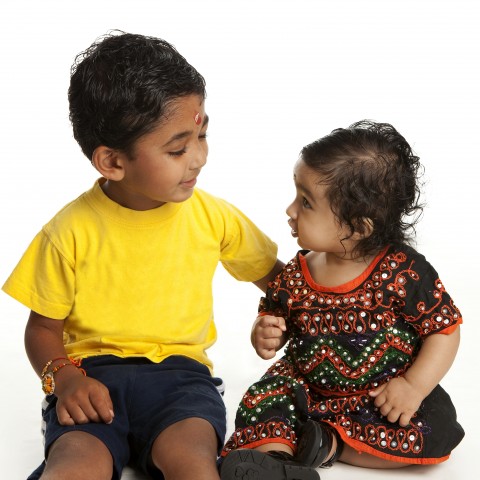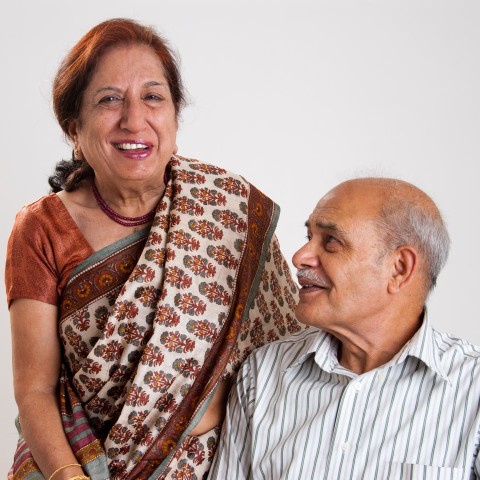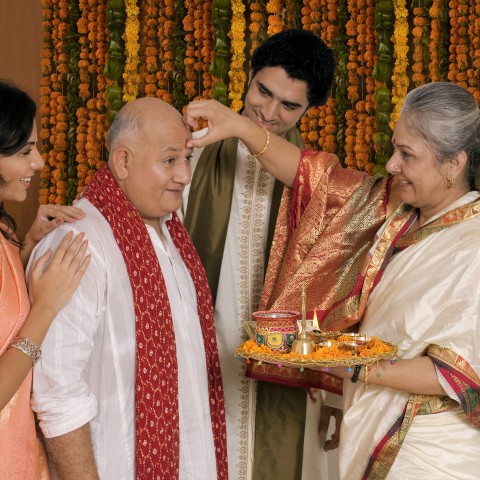Planning to socialize in India? Be ready for a bundle of cultural surprises! Whether you’re up for an informal meeting with friends, attending parties, having a chat with colleagues in the office, or giving interviews, chances are people would also like to know about your family in Hindi. Thus, if you’re going to try learning any conversation topic, know that talking about relatives in Hindi can get you major bonus points among the locals!
Table of Contents
- Why Learn About the Indian Family in Hindi?
- Typical Features of an Indian Family
- How to Say “Family” in Hindi?
- Types of Family Structures in Hindi
- Hindi Terms for Immediate Family Members
- Hindi Terms for Relatives
- Hindi Terms for Family Members as a Married Person
- Endearment Terms in the Indian Family
- Famous Hindi Proverbs for Family Members
- Learn the Indian Family Terms with HindiPod101.com
1. Why Learn About the Indian Family in Hindi?
The social dynamics within any typical Indian family are far different from those of the European and American families. In fact, several elements add to the diverse range of family ties in India. For instance, if you want to say “brother” in Hindi, there are different words for older and younger brothers. Sounds fascinating, right?
The family is also a reflection of our ancestral background. After all, we’re nothing but an extended part of our family. And having enough detailed knowledge to talk about your family in Hindi will also help you connect better with the local folks when they share about their own families.
That’s why you must know the Hindi terms to describe your family members. In this article, we’ll teach you the Hindi meaning of family, ways to address the family members, and how to describe your own family in Hindi. By the time you finish, you should be able to give a proper family introduction in Hindi when the time comes!
But before that, let’s take a look at some of the most peculiar features of an Indian family, including family customs in India and the family importance in Hindi culture.
2. Typical Features of an Indian Family
What is family in Hindi culture? What is a proper family description in Hindi of the average family? Here are some family details in Hindi culture that you should be aware of before your visit, and to give you a headstart as you learn how to talk about family in Hindi words!
Family Comes First: Yes, in India, the family holds a sacred place and is considered one of the strongest institutions in society. Blood relations are paramount to Indian people, and family honor is taken quite seriously.
Arranged Marriages are Common: There’s a unique concept of arranged marriages in India. As the name suggests, these are arranged by the parents and other elders in the family. In such marriages, the history, conduct, and financial reputation of both the families play a huge role in finalizing marriage proposals.
Specific Terms to Address Every Member: There are different ways to name family members depending on your relationship to them. Unlike in English, in which “aunt” and “uncle” cover a wide range of relations, the Hindi language has a different word for every family member.
Age Difference Matters: When it comes to family and relations in Hindi, age difference plays a crucial function in deciding how you’re going to address a family member. Elders have to be addressed with special words to show the utmost respect toward them, even if they’re your older siblings.
Living Under One Roof: As old-fashioned as it may seem, the truth is what it is. It’s not uncommon to see grown-ups living with their parents and in-laws, in the same house and sharing the same kitchen. However, this culture is fading with time due to jobs in different towns, cultural conflicts, generation gaps, and privacy issues of the couples. Over time, there’s less living together of the joint and nuclear family in Hindi over generations.
Celebrating Family Relations: There are many fasts, festivals, and religious rituals for the most fundamental relationships in India. For instance, we worship girls (daughters and sisters) on Navratri. Then, there are ceremonies for babies when they eat solid food for the first time. The festival of Raksha Bandhan is believed to strengthen the bond between brother and sister. We also have a fast where the wife fasts for the long life and well-being of her husband, etc.
Such an interesting history of Indian traditions and festivities! Not that we want to boast here, but uncovering the versatile cultural aspects of India is enough to make you fall in love with the country.
3. How to Say “Family” in Hindi?
Speaking Hindi is undeniably a great way to discover the more personal side of India and form a deeper connection with its people. We know you don’t want to miss it, and that’s where the necessity of chatting about your family in Hindi comes in! This means that you must know, first and foremost, how to say “family” in Hindi.
In the Hindi language, the word “family” can be said in many ways. We’re going to share with you some of the most commonly spoken Hindi/Urdu words for “family.”
1- घर (ghar) “Family/House/Home”
Technically, the word घर (ghar) means the house in which we live. But Indians generally use it while talking about their family.
So, the correct usage can be understood depending on the contextual basis of the ongoing conversation. Here are two different examples for both meanings.
- उसका घर काफ़ी दूर है।
(uSakaa ghar kaafii Duur hai.)
“His/her house is quite far away.”
Here, घर (ghar) is used for the physical house.
- मेरे घर में चार सदस्य हैं।
(mere ghar men caar SaDaSya hain.)
“There are four members in my family.”
Here, घर (ghar) is used to represent the family.
2- परिवार (parivaar) “Family”
The word परिवार (parivaar) is specifically used for “family.” It is the second most common term for “family” after घर (ghar).
Let’s see it in use with a phrase that’s popularly used in India.
- छोटा परिवार, सुखी परिवार।
(chotaa parivaar, Sukhii parivaar.)
It means “Small family, Happy family,” which is actually the slogan for a family planning ad. The phrase is used exclusively for the nuclear family in Hindi culture, which is advocated (advertised) to have a happy family status in Hindi regions.
Similarly, if you wish to express love for your family, here’s how to say “I love my family” in Hindi!
- मुझे अपने परिवार से प्यार है।
(mujhe apaNe parivaar Se pyaar hai.)
“I love my family.”
3- ख़ानदान (khaaNaDaaN)
This is an Urdu word for “family,” but is commonly spoken by all, regardless of their religion. In addition to that, many a time, we refer to it in the context of family background, such as the wealth and character of the family.
- वे बहुत रईस और इज़्ज़तदार ख़ानदान से हैं।
(ve bahuT raiiS aur izzaTaDaar khaaNaDaaN Se hain.)
“They are from a rich and highly reputed family.”
The word ख़ानदान (khaaNDaaN) can also be replaced with घराना (gharaaNaa) which has the same meaning.
4. Types of Family Structures in Hindi
Now, we’ll teach you about the different family patterns in India and ways to talk about family in Hindi.
1- The Joint Family in Hindi Culture
The family in Hindi we’ll talk about first is the joint family. As we all know, having a joint family means living with your spouse, parents, kids, and family of uncles and aunts under one roof.
The “joint family” meaning in Hindi is संयुक्त परिवार (SanyukT parivaar).
- मैं संयुक्त परिवार में रहती हूँ।
(main SanyukT parivaar men rahaTii huun.)
“I live in a joint family.”
2- The Moderate Family in Hindi Culture
We also have moderate family structures in India, where the parents live with their son and his wife. Such families neither qualify as a joint family or a nuclear family.
The “moderate family” meaning in Hindi is मध्यम परिवार (maDHyam parivaar).
- मैं मध्यम परिवार में रहती हूँ।
(main maDHyam parivaar men rahaTii huun.)
“I live in a moderate family.”
3- The Nuclear Family in Hindi Culture
Such a family structure has only the couple and their kids living with them in the same house. There are many words which can be aptly used for a nuclear family in Hindi. The most common Hindi meaning of “nuclear family” is छोटा परिवार (chotaa parivaar).
Another phrase which is regularly spoken for the “nuclear/small family” in Hindi meaning, is लघु परिवार (Laghu parivaar).
The term एकल परिवार (ekaL parivaar) also qualifies as a “nuclear family” meaning in Hindi. However, it’s only treated as a formal phrase.
- मैं एकल परिवार में रहती हूँ।
(main ekaL parivaar men rahaTii huun.)
“I live in a nuclear family.”
4- The Extended Family in Hindi Culture
All the aunts, uncles, cousins, and other blood relations form the extended family. It’s subtly different from the joint family.
In a joint family, the members live in the same house, whereas this may not be the case of an extended family.
The “extended family” meaning in Hindi would be विस्तृत परिवार (viSTriT parivaar).
It’s time to move on to the most important segment in this article, which is calling/addressing your family members in Hindi.
5. Hindi Terms for Immediate Family Members
As we mentioned above, the ways to address the Indian family members is a bit different than doing so in European and American countries. But it becomes simpler when we take it one step at a time. Here, we’re going to convert family relations in Hindi to English (and vice-versa), as well as show you a family relationship chart in Hindi and English for better comprehension when necessary.
1- Mother
What could be a more beautiful way to start than with the word “mother” in Hindi? You must already be aware of the common English terms for mother, like “mommy,” “mom,” “mamma,” etc. In the same way, Indians also use more than one expression for their loving mothers.
1) माँ (maan) / अम्मा (ammaa)
Well, both of these expressions undoubtedly symbolize the most ancient culture of India. अम्मा (ammaa) is considered to be rather warm and tender, as it’s quite close to the natural sound a baby makes. The word माँ (maan) may happen to be derived from the expression अम्मा (ammaa).
You’ll often hear this in old Hindi Bollywood movies, where the actors can be seen calling their mothers माँ (maan) / अम्मा (ammaa) with love. Nonetheless, Indians admire the word so much that even today, out of affection and respect, doctors, bus conductors, street vendors, and other people, use the word अम्मा (ammaa) for any old woman.
Let’s see how to use these words for family in Hindi sentences:
- मेरी माँ को भारत बहुत पसंद है।
(merii maan ko bhaaraT bahuT paSaND hai.)
“My mother just loves India.” - अम्मा, आपको पानी पीना है क्या ?
(ammaa, aapako paaNii piiNaa hai kyaa?)
“Mother, would you like to have some water?”
2) मम्मी (mammii)
The expression मम्मी (mammii) is the most popular of all in the Indian family. It’s neither abruptly modern nor uneasily old-fashioned. Both adults and children of today’s generation fondly use the word मम्मी (mammii) while having a chat with their mothers.
- मेरी मम्मी बहुत लज़ीज़ खाना बनाती हैं।
(meri mammii bahuT Laziiz khaaNaa baNaaTii hain.)
“My mother cooks really delicious food.”
3) माताजी (maaTaajii)
Just like अम्मा (ammaa), another widely known word for “mother” in Hindi is माताजी (maaTaajii). Indians are comfortable calling their mothers (or women of their mother’s age) by the name माताजी (maaTaajii).
- माताजी, अब आपकी तबियत कैसी है?
(maaTaajii, ab aapakii TabiyaT kaiSii hai?)
“Mother, how is your health now?” or “Mother, how are you feeling now?”
4) अम्मी (ammii)
The word अम्मी (ammii) is specifically practiced by Muslims. Sometimes, they also add जान (jaaN) to the end of it, such as in अम्मी जान (ammii jaaN), which is done out of sheer admiration.
- अम्मी जान, आपके लिए खाना तैयार है।
(ammii jaaN, aapake Liye khaaNaa Taiyaar hai.)
“Dear mother, your dinner/lunch is ready.”
2- Father
Now that we’ve learned the Hindi words for “mother,” it’s time to find out the meaning of “father” in Hindi too. Similar to “mother,” there are several names for a father in Hindi.
1) बाबू (baabuu) / बापू (baapuu) / बाबा (baabaa)
In the olden times, native Indians would admirably call their fathers by these three names, which are बाबू (baabuu) / बापू (baapuu) / बाबा (baabaa). However, the phrases are quite traditional and are sparingly used in the present time.
- मेरे बाबा अपने कमरे में सो रहे हैं।
(mere baabaa apaNe kamare men So rahe hain.)
“My father is sleeping in his room.”
2) पिताजी (piTaajii)
Compared to the above names, पिताजी (piTaajii) is a little more popular.
- पिताजी, आपकी दवा का समय हो गया है।
(piTaajii, aapakii Davaa kaa Samay ho gayaa hai.)
“Father, it’s time for your medicine.”
3) पापा (paapaa) / डैडी (daidii)
The whole world is familiar with the words “papa” and “daddy,” India included. Almost everyone in modern India loves to call their father पापा (paapaa) or डैडी (daidii).
- मेरे पापा / डैडी अभी जापान में हैं।
(mere paapaa/daidii abhii jaapaaN men hain.)
“Currently, my father is in Japan.”
4) अब्बा (abbaa)
In the Muslim religion, kids and adults can be heard addressing their fathers by the name अब्बा (abbaa). They also happen to use other alternatives, such as अब्बा जान (abbaa jaaN) and अब्बू (abbuu).
- मेरे अब्बा जान मुझसे बहुत प्यार करते हैं।
(mere abbaa jaaN mujhaSe bahuT pyaar karaTe hain.)
“My father loves me a lot.”
3- Combined Words for Parents
Although there’s no single Hindi word for “parents,” we do have a few “pair” words to say “parents” in Hindi.
1) माँ-बाप (maan – baap)
- उनके माँ – बाप का निधन हो चुका है।
(uNake maan – baap kaa NiDHaN ho cukaa hai.)
“His/her parents have passed away.”
2) माता-पिता (maaTaa-piTaa)
- क्या आपके माता-पिता आपके साथ रहते हैं?
kyaa aapake maaTaa-piTaa aapake SaaTH rahaTe hain?
“Do your parents live with you?”
4- Sister
Now, we’ll learn how to say “sister” in Hindi! As previously mentioned about the cultural aspects of the Indian society, might we remind you that Indians prefer to address their elders (even siblings) differently than they would their younger ones.
Obviously, this leads to a few separate terms for older sisters, too. The basic meaning of “sister” in Hindi is बहन (bahaN).
- मेरी बहन मुझसे दो साल छोटी है।
(merii bahaN mujhaSe Do SaaL chotii hai.)
“My sister is two years younger than me.” - मेरी दो बहनें हैं। एक मुझसे छोटी है और एक बड़ी।
(merii Do bahaNen hain. Ek mujhaSe chotii hai aur ek badii.)
“I have two sisters. One is younger than me and the other is older.”
Here’s a family chart Hindi people would use for sisters in various contexts.
| बहन (bahaN) | Sister |
| बड़ी बहन (badii bahaN) | Elder Sister |
| छोटी बहन (chotii bahaN) | Younger Sister |
| दीदी (DiiDii) | Elder Sister |
| अप्पी (appii) | Elder Sister (Urdu word used by Muslims) |
| आपा (aapaa) | Elder Sister (Urdu word used by Muslims) |
In the above examples, the Hindi word for “sister” can be replaced by any of these terms, depending on the suitability and preferences of the speaker.
Let’s take a closer look at this with another pair of examples.
- मेरी दीदी बाज़ार गयी है।
(merii DiiDii baazaar gayii hai.)
“My sister is off to the market.” - मेरी अप्पी बाज़ार गयी है।
(merii appii baazaar gayii hai.)
“My sister has gone to the market.”
As you can see, we just replaced the word दीदी (DiiDii) with अप्पी (appii).
5- Brother
Just like “sister,” we have separate words for “brother” in Hindi. The typical Hindi term for a brother is भैया (bhaiyyaa).
| भैया (bhaiyyaa) | Brother (Affectionately used for older brothers, but can be said for males of any age) |
| भाई (bhaaii) | Brother |
| छोटा भाई (chotaa bhaaii) | Younger Brother |
| बड़ा भाई (badaa bhaaii) | Elder Brother |
| दादा (DaaDaa) | Elder Brother (Usually used by Bengali people) |
| भाई जान (bhaaii jaaN) | Elder Brother (Urdu word used by Muslims) |
Let’s see how these words are said in a sentence.
- मेरे भैया अभी भारत से बाहर हैं।
(mere bhaiyyaa abhii bhaaraT Se baahar hain.)
“My brother is currently out of India.” - भाई जान सो रहे हैं।
(bhaaii jaaN So rahe hain.)
“My brother is sleeping.”
6- Combined Words for Siblings
You may also like to know if Hindi has any particular word for “sibling.” Well, as it turns out, the most common Hindi expression for “siblings” is not a word, but a phrase: भाई-बहन (bhaaii-bahaN).
- आपके कितने भाई-बहन हैं?
(aapake kiTaNe bhaaii-bahaN hain?)
“How many siblings do you have?”
7- Grandparents in Hindi
Before we explore the Hindi words for grandparents, here’s a tip that will come in handy whenever you visit India: We have separate and specific names for paternal and maternal grandparents.
| Relationship | Paternal | Maternal |
|---|---|---|
| Grandmother | दादी (DaaDii) | नानी (NaaNii) |
| Grandfather | दादा (DaaDaa) | नाना (NaaNaa) |
| Great-Grandmother | परदादी (paraDaaDii) | परनानी (paraNaaNii) |
| Great-Grandfather | परदादा (paraDaaDaa) | परनाना (paraNaaNaa) |
Let’s begin with the meaning of “grandmother” in Hindi.
1) Grandmother in Hindi
दादी (DaaDii) is the “grandmother” meaning in Hindi. परदादी (par DaaDii) is the correct word if you’re wondering about the “great-grandmother” meaning in Hindi.
- आपकी दादी से मिलकर बहुत अच्छा लगा।
(aapakii DaaDii Se miLakar bahuT acchaa Lagaa.)
“It was a pleasure meeting your grandmother.”
But in case you want to say “my grandmother” in Hindi while referring to your maternal grandmother, then replace दादी (DaaDii) with नानी (NaaNii). Similarly, Indians call their great-grandmother (maternal) परनानी (paraNaaNii).
2) Grandfather in Hindi
When Indians happen to talk about their paternal grandfather in Hindi, they use the word दादा (DaaDaa). And परदादा (par DaaDaa) is the proper term for our great-grandfather (paternal).
When talking about one’s maternal grandfather, it would be नाना (NaaNaa), and परनाना (par NaaNaa) for the great-grandfather.
- मेरे परनाना को संगीत में काफ़ी रूचि थी।
(mere par NaaNaa ko SangiiT men kaafii ruci THii.)
“My great-grandfather had quite a liking for music.”
Up to this point, we’ve covered a lot of basic Hindi terms for our immediate family members. Now is the time to explore other family relationships in the Indian family, and learn the common terms for them. This way, you’ll have no problems talking about the whole family in Hindi!
6. Hindi Terms for Relatives
When you want to tell about your family in Hindi, remember that, in general, the relatives are called रिश्तेदार (risTeDaar) in Hindi. The other popular term for relatives is ख़ानदान वाले (khaaNaDaaN vaaLe).
- हमारे सारे रिश्तेदार दिल्ली में ही रहते हैं।
(hamaare Saare risTeDaar DiLLii men hii rahTe hain.)
“All of our relatives live in Delhi only.”
Below, we’ve described all the basic terminology for the paternal family as well as the maternal family. Check these out.
1- Paternal Relatives
All the terms below have been mentioned in a couple forms. That means the specific term for “uncle” has been paired with the “aunt” terms in the same relationship context.
| Relationship | Uncle | Aunt |
|---|---|---|
| Father’s brother and his wife. | चाचा (caacaa) | चाची (caacii) |
| Father’s younger brother and his wife (assuming father has two younger brothers). | छोटे चाचा (chote caacaa) | छोटी चाची (chotii caacii) |
| Father’s elder brother and his wife (assuming father has two younger brothers). | बड़े चाचा (bade caacaa) | बड़ी चाची (badii caacii) |
| Father’s elder brother and his wife. | ताऊ जी (Taauu jii) | ताई जी (Taaii jii) |
| Father’s sister and her husband. | फूफा जी (phuuphaa jii) | बुआ जी (buaa jii) |
One might notice that in Hindi, most of the terms for males end with the sound –आ (-aa), such as चाचा (caacaa) and फूफा (fuufaa). In the same vein, terms for females end with the sound –ई (-ii), such as चाची (caacii) and ताई (Taaii). These different sounds for male-female terms also change the verb form in sentences.
However, these rules aren’t true for all of the words, thus making a way for some exceptions. For instance, the word ताऊ जी (Taauu jii) is for “uncle” and बुआ जी (buaa jii) is for an aunt.
Moreover, we would also like to point out that when we talk about an elderly person or use a highly respectful tone for any person in that sense, we happen to use the plural verb form for a singular person.
For instance, if you would like to mention your younger brother, the verb form would be:
- मेरा भाई विद्यालय जाता है।
(meraa bhaaii viDyaaLay jaaTaa hai.)
“My brother goes to school.”
But when you mention your father (or any other person with respect), the verb form changes.
- मेरे पिता दफ़्तर जाते हैं।
(mere piTaa DafTar jaaTe hain.)
“My father goes to the office.”
The same is true in the case of females.
- मेरी बहन गाना गाती है।
(merii bahaN gaaNaa gaaTii hai.)
“My sister sings a song.” - मेरी मम्मी खाना पकाती हैं।
(merii mammii khaaNaa pakaaTii hain.)
“My mother cooks food.”
2- Maternal Relatives
This is the family tree chart in Hindi for our maternal relatives.
| Relationship | Husband | Wife |
|---|---|---|
| Brother and his wife. | भैया (bhaiyyaa) | भाभी (bhaabhii) |
| Sister and her husband. | जीजा (jiijaa) | दीदी (DiiDii) |
| Mother’s brother and his wife. | मामा जी (maamaa jii) | मामी जी (maamii jii) |
| Mother’s sister and her husband. | मौसा जी (mauSaa jii) | मौसी जी (mauSii jii) |
- मेरी दीदी और जीजा ख़रीदारी के लिए बाहर गए हैं।
(merii DiiDii aur jiijaa khariiDaarii ke Liye baahar gaye hain.)
“My sister and her husband have gone out shopping.”
3- Nephews and Nieces
Typically, these four words are enough to refer to your nephews and nieces in Hindi.
| Relationship | Nephews and Nieces |
|---|---|
| Brother’s Son. | भतीजा (bhaTiijaa) |
| Brother’s Daughter. | भतीजी (bhaTiijii) |
| Sister’s Son. | भांजा (bhaaNjaa) |
| Sister’s Daughter. | भांजी (bhaaNjii) |
- सीमा की भतीजी चार साल की है।
(Siimaa kii bhaTiijii caar SaaL kii hai.)
“Seema’s niece is four years old.”
7. Hindi Terms for Family Members as a Married Person
Now, we’ll discuss and practice some Hindi terms for relationships that grow around us when we’re married. For instance, what do Indians call their father-in-law (Hindi)? And what’s the “brother-in-law” Hindi meaning? How are they used in a sentence?
| Relationship | Terms |
|---|---|
| Wife. | बीवी (biivii); पत्नी (paTNii); धर्मपत्नी (DHarmapaTNii) |
| Husband. | मियाँ (miyaan); पति (paTi) |
| Son. | बेटा (betaa); बच्चा (baccaa); लड़का (Ladakaa) |
| Daughter. | बेटी (betii); बिटिया (bitiyaa); बच्ची (baccii); लड़की (Ladkii) |
| Mother-in-law. | सास (SaaS) |
| Father-in-law. | ससुर (SaSur) |
| Husband’s younger brother and his wife. | देवर (Devar) – देवरानी (DevaraaNii) |
| Husband’s elder brother and his wife. | जेठ (jeth) – जेठानी (jethaaNii) |
| Wife’s brother. | साला (SaaLaa) |
| Wife’s sister. | साली (SaaLii) |
| Husband’s sister and her husband. | ननद (NaNaD) – नन्दोई (NaNDoii) |
- मेरी पत्नी का नाम पूजा है।
(merii paTNii kaa Naam puujaa hai.)
“My wife’s name is Pooja.” - मेरे देवर के दो बच्चे हैं।
(mere Devar ke Do bacce hain.)
“My brother-in-law has two kids.” - तुम्हारे ससुर का स्वास्थ्य कैसा है ?
(Tumhaare SaSur kaa SvaaSTHy kaiSaa hai?)
“How is the health of your father-in-law?”
8. Endearment Terms in the Indian Family
Every language has some affectionate words for their family members. Indians also have the habit of addressing their loved ones with these typical endearment terms.
The everyday words for daughters, sisters, or even little girls are गुड़िया (gudiyaa), बिटिया (bitiyaa), बच्ची (baccii), and मुन्नी (muNNii).
- अरे ! आपकी बिटिया कितनी प्यारी है।
(arey! aapaki bitiyaa kiTaNii pyaarii hai.)
“Oh! Your daughter is so cute.”
Similarly, male children are usually called बाबू (baabuu), मुन्ना (muNNaa), and भैया (bhaiyyaa). And the elderly males can be called काका (kaakaa).
9. Famous Hindi Proverbs for Family Members
Lastly, we’ve collected some famous Hindi quotations and proverbs for you to understand the emotional attachments of Indians to their parents and vice-versa. Learning these quotes about family in Hindi is a fantastic way to boost your understanding of the family culture in India.
- जैसा बाप वैसा बेटा / वैसी बेटी
(jaiSaa baap vaiSaa betaa/vaiSii betii.)
“Like father, like son/daughter.” - उसके होठों पे कभी बद्दुआ नहीं होती, बस एक माँ है जो कभी ख़फ़ा नहीं होती।
(uSake hothon pe kabhii baDDuaa Nahiin hotii, baS ek maan hai jo kabhii khafaa Nahiin hotii.)
“Never is there a curse on her lips, it’s the mother who never gets upset with us.” - चाहे लाख करो तुम पूजा, और तीर्थ करो हज़ार,
मगर माँ बाप को ठुकराया तो सब कुछ है बेकार।
(caahe Laakh karo Tum puujaa, aur TiirTH karo hazaar, magar maan baap ko thukraayaa To Sab kuch hai bekaar.)
“It doesn’t really matter how many prayers you offer and how many religious places you visit, if you have denied the care to your parents, everything is worthless.”
10. Learn the Indian Family Terms with HindiPod101.com
Loving the topic so far? Want to learn how to further define family in Hindi? Well, we have so much more to share with you on HindiPod101.com. Check out our blog and website for plenty of other useful Hindi resources and lesson materials. Enrich your Hindi language skills with our simple and effective teaching methods. You can also check out all of our free Hindi resources!
Download our free mobile app for an unstoppable journey of language-learning. Facing trouble? Feel free to connect with us through our Help Center. You can also share your queries and clear your doubts by joining the HindiPod101.com Forum. Have happy learning!
Before you go, why not practice talking about family in Hindi writing? Write about your family in Hindi for us in the comments section! Are there any words, terms, or concepts you’re struggling with? Feel free to reach out with any questions, as well. We look forward to hearing from you!























